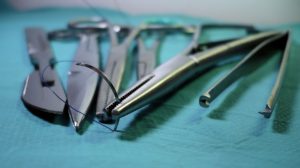Why a Surgeon May Be Responsible for Your Infection

Surgeries can range from just a quick cut to incredibly invasive and physically traumatic. In every surgery, you hope that the surgeon mas made sure their tools and operating room have been properly cleaned and sterilized before they begin. After all, given how dirty hospitals can become, surgeons and nurses need to be careful to not allow bacteria and viruses to be introduced into their patient’s bodies. Sadly, some surgeons are incredibly negligent, and their negligence allows for deadly surgical infections.
Why Surgical Infections Happen
Surgery is the act of cutting open a patient’s body in order to fix an underlying issue. While the proper medicine can treat a number of diseases and injuries, surgeries are often required for a number of injuries. However, the human body is not made to be cut open. Even minor surgeries can lead to serious trauma. That is why surgeons and nurses must follow certain steps. If your surgical team neglects to follow the proper sanitizing steps and procedures, you may find yourself with a very dangerous infection. Common causes of surgical infections include:
The incision site was not cleaned: Our bodies are covered in bacteria, but they are not inherently harmful if they do not enter our bodies. If the part of your body that is being operated on is not cleaned and sanitized, then that can allow the bacteria to enter the body.
The surgical instruments were not properly sanitized or cleaned: As bacteria can be found on almost any surface, surgical instruments must be properly cleaned and sanitized before use. Otherwise, they could introduce dangerous germs into the patient’s body.
The operating room was not properly cleaned: Just like with the tools, the operating room must be properly cleaned and sanitized before a surgery takes place. Hospitals should routinely clean facilities before and after each surgery.
The medical professionals involved did not wash their hands: Everyone involved in a surgery should wash their hands and then put on plastic gloves. This ensures that bacteria on the surgeon and nurses do not get into the patient’s body. Some medical professionals neglect this important first step, either forgetting or neglecting to do it by choice. What ever the case may be, it is incredibly dangerous.
The surgical team failed to preserve the sterile field: In a surgery, there will be sterile and non-sterile parts of the operative room. Moving things between the fields can create the risk for a surgical infection. This can happen if a member of the surgical team uses dirty gloves to touch a previously sterile instrument.
Watching Out for a Surgical Infection
After surgery, you should keep your eyes peeled for the telltale signs of an infection. Missing these symptoms could easily lead to serious medical consequences. Signs and symptoms to watch out for include:
- Redness around the wound
- Swelling around the wound
- Inflammation around the wound
- The wound feels warm or you develop a fever
- Emission of pus, commonly white or yellow
- A noticeable delay in recovery and healing
- Intense pain around the wound
Of course, these symptoms may only be noticeable in more shallow wounds. For invasive surgeries, as in surgeries that require the surgeon to cut deep into your body, the signs of an infection may not be as noticeable. If you have had an invasive surgery, then you should keep careful track of how long the healing process is taking, any pain near your incision, and fevers, even mild ones, that won’t seem to go away. If you suspect that you have an infection, then you should seek help right away.
How to Get Help
Infections can be fatal, especially if they are deep in your body, so if you suspect that you have one, you should seek medical assistance immediately. A doctor can run tests and diagnose what is wrong and then give you the treatment you need to heal. If you are worried about returning to the same hospital that performed the surgery, which would be completely reasonable, then you should seek out help from another hospital or from your general practitioner.
Surgeries are expensive enough without having to add on further treatment for infections. The surgical team and hospital or surgery center responsible for the negligent cleaning and sanitation practices should be held liable for your suffering, as well as your expenses. Of course, the hospital and its insurance provider are unlikely to offer a fair settlement. That is why you need to have an experienced Denver medical malpractice attorney.
At Leventhal Puga Braley P.C., our legal team is made up of the top medical malpractice attorneys in the country. For more than 40 years, we have won record-breaking cases for our clients in medical malpractice trials. If you bring your case to us, we will utilize all of our resources, skill, and knowledge to investigate your case and hold the at-fault party responsible for your injuries, whether it was a doctor, nurse, or hospital. Call Leventhal Puga Braley P.C. at (303) 759-9945 or toll-free at (877) 433-3906 today to schedule a free consultation.